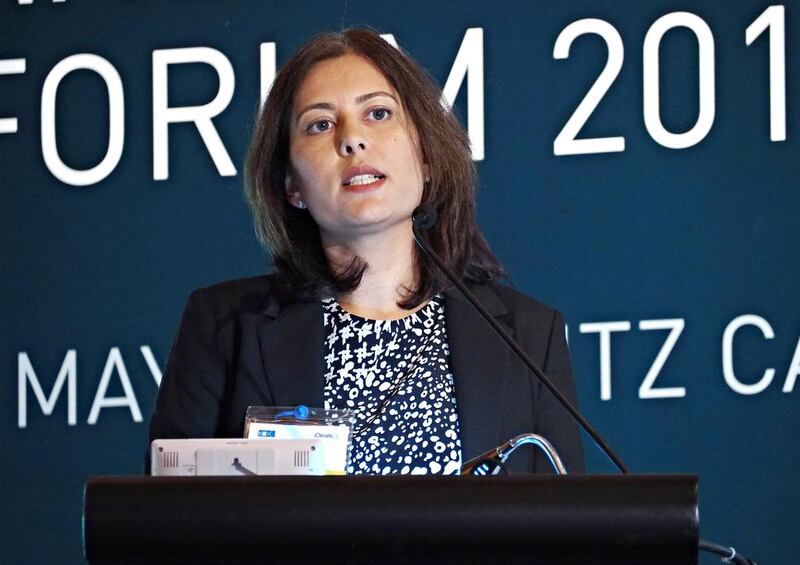Business borrowers are steeled for a tough year ahead following a slew of warnings from banks over a looming credit squeeze.
As the funding pool shrinks small firms are already struggling.
“One of the main things we expect to see in the GCC, including the UAE, is that liquidity will become tighter,” said Marios Maratheftis, chief economist at Standard Chartered bank, at a briefing in Dubai yesterday.
The reduction of government deposits in regional banks is drying up the liquidity normally available to businesses.
One major UAE bank has already reported a rise in the number of small business owners skipping the country after failing to meet repayments.
Mr Maratheftis said that the UAE had only cut spending marginally and, like other GCC governments, had used budgets “to absorb some of the shock” caused by falling revenues from lower oil prices by continuing to invest in priority areas such as infrastructure, education and health care.
“It is exactly what needs to happen in a cyclical downturn,” he added.
However, the withdrawal of government deposits from local banks will mean there is less liquidity.
“It’s not a credit crunch, it is not a crisis, but we are no longer in an environment where there is ample liquidity,” said Mr Maratheftis. “I think it will continue to be tighter next year for everyone.”
National Bank of Abu Dhabi said yesterday government deposits fell by more than $13 billion in the past year.
Standard Chartered is predicting the UAE’s GDP will fall to 3.8 per cent this year, from 4.5 per cent last year.
Speaking at the Coface Country Risks conference in Dubai on Monday, Emirates NBD’s head of Mena research, Khatija Haque, said government deposits typically make up 20 to 40 per cent of total bank deposits in the UAE, Saudi Arabia and Qatar.
“We have seen that decline quite sharply. We have seen numbers from the [UAE] central bank showing that government deposits in the year to September are 20 per cent lower than they were last year.”
There are already signs that a tighter credit environment is affecting the UAE’s small business sector.
Bloomberg yesterday reported that the number of SME company owners who are skipping the country without paying loans is increasing, citing an Emirates NBD official.
In an interview with The National, Alex Thursby, National Bank of Abu Dhabi's chief executive, said there had been "a little fallout, but nothing major" as a result of non-performing loans from SMEs.
“At the top end, there has been no change. And that is because those companies are really well run,” Mr Thursby said. “I think the guys below – and I think the smaller they get, the more difficult it gets for them – there will be a cull, as there is whenever there is slowing economic growth.”
He said there were SMEs and certain sectors that NBAD chooses not to bank with, but added it was attempting to make small firms more bankable by working with owners.
“The sector is sometimes misunderstood,” said Mr Thursby. “SMEs can be a good, profitable business.”
Essam Disi, senior manager of strategy and policy at Dubai SME, said access to finance has always been a challenge, but in recent months it hasn’t been as important as high rents or increased competition.
“On the one hand it has got more difficult for SMEs after HSBC and Standard Chartered pulled back from the sector, and with other banks adding more requirements for SME banking services.
“But at the same time, a lot of SMEs are telling us they are able to rely on the banking sector here, and banks are getting more aggressive with their SME offerings,” he said.
Ambareen Musa, the chief executive of Souqalmal.com, agreed.
“Over the past year we have been seeing banks promoting their SME products even more – no one’s stopped lending,” she said.
However, she added that there were firms in certain sectors, such as petrochemicals, that were “struggling like there’s no tomorrow”.
According to a survey this week by Gulf Finance, the SME lending arm of the Dubai-based investment bank Shuaa Capital, small businesses are increasingly becoming pessimistic about the outlook for growth as collecting payments and raising finance become more difficult.
Things can be even tougher for start-ups.
“We face difficulties all the time because it’s always difficult starting a new business,” said Paris Norriss, the director at Coba Education, a company that recruits teachers and other support staff for schools and government authorities. “Generally when you are in the first two years of setting up your business, financing isn’t available to you anyway. Banks won’t lend to you and most companies won’t.”
mfahy@thenational.ae
* with reporting by Mahmoud Kassem and John Everington
Follow The National's Business section on Twitter






